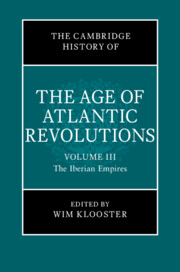Book contents
- The Cambridge History of the Age of Atlantic Revolutions
- The Cambridge History of the Age of Atlantic Revolutions
- The Cambridge History of the Age of Atlantic Revolutions
- Copyright page
- Contents
- Figures
- Maps
- Tables
- Contributors to Volume III
- Preface
- Introduction
- Part I The Spanish Empire
- 1 The Spanish Empire: General Overview
- 2 The Spanish Empire on the Eve of American Independence
- 3 The Cortes of Cádiz and the Spanish Liberal Revolution of 1810–1814: Atlantic and Spanish American Dimensions
- 4 The Constitutional Triennium in Spain, 1820–1823
- 5 Mexico: From Civil War to the War of Independence, 1808–1825
- 6 Central America
- 7 War and Revolution in the Southern Cone, 1808–1824
- 8 Caribbean South America: Free People of Color, Republican Experiments, Military Strategies, and the Caribbean Connection on the Path to Independence
- 9 The Southernmost Revolution: The Río de la Plata in the Early Nineteenth Century
- 10 Royalists, Monarchy, and Political Transformation in the Spanish Atlantic World during the Age of Revolutions
- 11 Africans and Their Descendants in the Spanish Empire in the Age of Revolutions
- 12 Concepts on the Move: Constitution, Citizenship, Federalism, and Liberalism across Spain and Spanish Atlantic
- 13 Patriarchy, Misogyny, and Politics in the Age of Revolutions
- 14 Impact of the French Caribbean Revolutions in Continental Iberian America, 1791–1833
- 15 Deferred but not Avoided: Great Britain and Latin American Independence
- Part II Brazil, Portugal, and Africa
- Index
12 - Concepts on the Move: Constitution, Citizenship, Federalism, and Liberalism across Spain and Spanish Atlantic
from Part I - The Spanish Empire
Published online by Cambridge University Press: 20 October 2023
- The Cambridge History of the Age of Atlantic Revolutions
- The Cambridge History of the Age of Atlantic Revolutions
- The Cambridge History of the Age of Atlantic Revolutions
- Copyright page
- Contents
- Figures
- Maps
- Tables
- Contributors to Volume III
- Preface
- Introduction
- Part I The Spanish Empire
- 1 The Spanish Empire: General Overview
- 2 The Spanish Empire on the Eve of American Independence
- 3 The Cortes of Cádiz and the Spanish Liberal Revolution of 1810–1814: Atlantic and Spanish American Dimensions
- 4 The Constitutional Triennium in Spain, 1820–1823
- 5 Mexico: From Civil War to the War of Independence, 1808–1825
- 6 Central America
- 7 War and Revolution in the Southern Cone, 1808–1824
- 8 Caribbean South America: Free People of Color, Republican Experiments, Military Strategies, and the Caribbean Connection on the Path to Independence
- 9 The Southernmost Revolution: The Río de la Plata in the Early Nineteenth Century
- 10 Royalists, Monarchy, and Political Transformation in the Spanish Atlantic World during the Age of Revolutions
- 11 Africans and Their Descendants in the Spanish Empire in the Age of Revolutions
- 12 Concepts on the Move: Constitution, Citizenship, Federalism, and Liberalism across Spain and Spanish Atlantic
- 13 Patriarchy, Misogyny, and Politics in the Age of Revolutions
- 14 Impact of the French Caribbean Revolutions in Continental Iberian America, 1791–1833
- 15 Deferred but not Avoided: Great Britain and Latin American Independence
- Part II Brazil, Portugal, and Africa
- Index
Summary
The aim of the chapter is to show the profound semantic transformations undergone by four key political concepts - citizenship, constitution, federalism, and liberalism - in the Spanish Atlantic at a time of imperial revolutions such as the first decades of the nineteenth century. Naturally, the great controversies surrounding these concepts and their associates that took place in those immense territories can only be summarized at the cost of a stylization of the most important changes. To this end, this essay draws on the results of the collective research project known as Iberconceptos, in which we set out to compare the trajectories of some twenty basic concepts in the Iberian territories on both sides of the Atlantic. The work emphasizes the inevitably experimental nature of the decisive political changes that took place in those years, and highlights the point of view of the actors, who faced with the conceptual tools available the imperative need to find answers to the extremely serious constitutional challenge triggered by the sudden displacement of the monarch considered legitimate (Fernando VII) from the throne of Madrid. This exceptional situation led them to propose new legal-political concepts and to try out new institutional arrangements.
Keywords
- Type
- Chapter
- Information
- The Cambridge History of the Age of Atlantic Revolutions , pp. 325 - 350Publisher: Cambridge University PressPrint publication year: 2023

